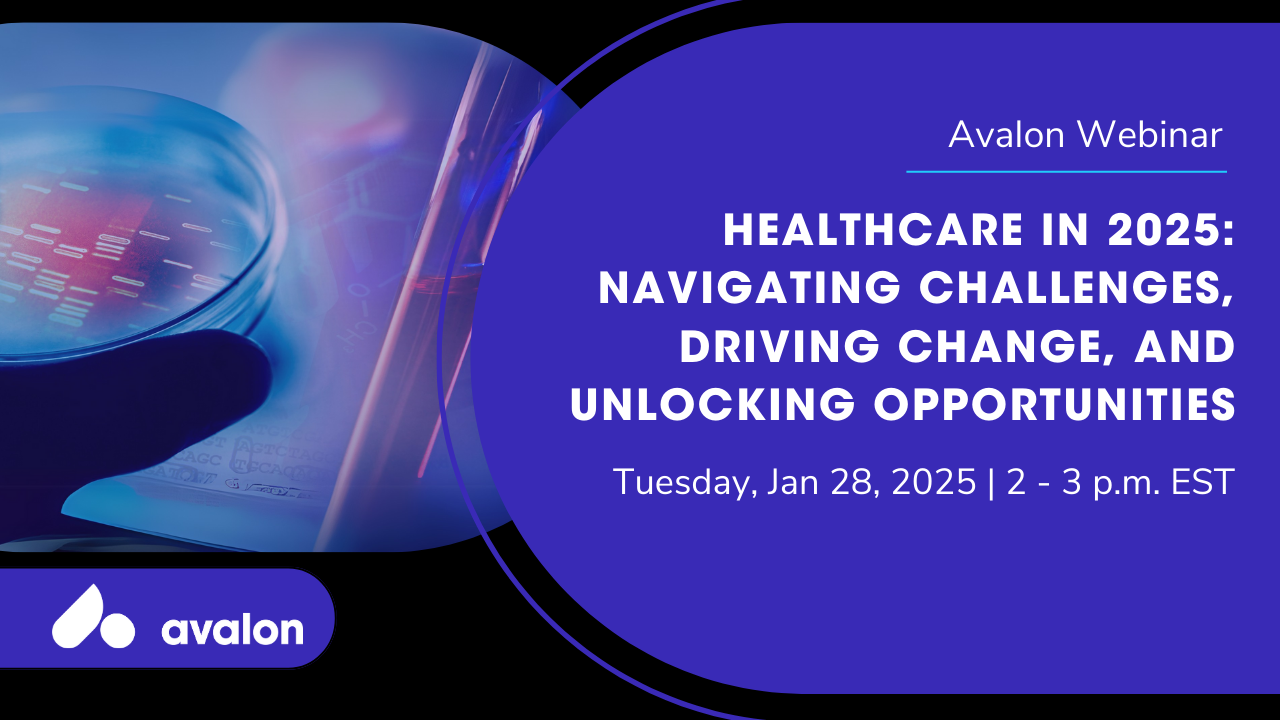Healthcare in 2025: Navigating Challenges, Driving Change, and Unlocking Opportunities
The webinar, hosted by Michelle Norton, SVP of Product Marketing at Avalon, explored key healthcare challenges, policy changes, and technological advancements shaping 2025. The webinar featured insights from Dr. Bill Kerr, CEO of Avalon Healthcare Solutions, and Julie Barnes, Principal at Maverick Health Policy, the discussion examined the impact of regulatory shifts, artificial intelligence (AI), prior authorization, and cost control in the healthcare ecosystem.
Regulatory Landscape and Policy Shifts
The evolving healthcare landscape is being shaped by new leadership and policy priorities, particularly with a changing administration. While regulatory uncertainty remains a major concern for industry professionals, the discussion highlighted that policy direction is still fluid. RFK Jr.’s potential appointment as HHS Secretary has sparked debate. The current administration has signaled a push toward deregulation, cost reduction, and a realignment of priorities, particularly in Medicaid and public health initiatives.
A key takeaway was that despite the perception that regulatory scrutiny might ease, complexities surrounding compliance will remain. The panelists noted that policies affecting Medicare, Medicaid, and reimbursement structures will continue to evolve, emphasizing cost containment and efficiency.
Artificial Intelligence in Healthcare
AI is poised to play a transformative role in healthcare, though its implementation varies across different sectors. The panel discussion focused on two primary areas: AI-driven automation for administrative efficiency and AI’s role in clinical decision-making. Two points include:
- Automation and Administrative Efficiency: AI is expected to streamline scheduling, billing, and revenue cycle management, reducing administrative burdens on healthcare providers. AI-enhanced prior authorization processes can minimize delays by swiftly analyzing patient data and ensuring compliance with coverage policies.
- Clinical Decision Support: While AI tools are being integrated into diagnostic support, the panelists were skeptical about AI’s widespread use in the exam room in 2025. Challenges include data interoperability, regulatory scrutiny, and the need for provider acceptance. AI’s most immediate impact will likely be in imaging analysis, predictive analytics, and drug development rather than direct patient interactions.
Prior Authorization: Balancing Efficiency and Oversight
Prior authorization (PA) remains a contentious issue in healthcare. The discussion underscored the industry’s push to modernize and automate PA processes to reduce administrative burdens while ensuring appropriate utilization of resources.
Key points included:
- The electronic prior authorization rule, set to take effect in 2026-27, is expected to enhance communication between payers and providers.
- AI-powered adjudication could expedite approvals for routine cases while maintaining human oversight for complex cases.
- The challenge remains in striking a balance between reducing friction in the system and ensuring cost-effective, evidence-based care.
Cost Containment: Drug Pricing and Market Consolidation
Rising healthcare costs, particularly related to drug pricing, remain a focal point for policymakers and industry stakeholders.
- Drug Price Negotiations: Medicare’s ability to negotiate drug prices will continue influencing pharmaceutical pricing strategies, but the long-term impact remains uncertain.
- GLP-1 Drugs and Coverage Decisions: The skyrocketing costs of GLP-1 weight-loss medications have forced insurers to reconsider coverage policies, balancing clinical benefits with financial sustainability.
- PBM Reforms: Congress is expected to continue targeting Pharmacy Benefit Managers (PBMs) to enhance transparency and reduce costs.
Food as Medicine: A New Healthcare Frontier?
The concept of “food as medicine” is gaining traction, particularly within the current administration. Unlike the previous administration’s focus, this initiative promotes integrating nutritional strategies into healthcare, potentially impacting Medicaid benefits and chronic disease management. However, the regulatory framework for implementing these programs remains unclear.
Cybersecurity and Healthcare Technology Risks
With an increasing reliance on digital infrastructure, cybersecurity threats are escalating. The Change Healthcare cyberattack highlighted vulnerabilities within the healthcare system, emphasizing the need for robust cybersecurity measures. AI’s role in both strengthening and potentially exploiting cybersecurity defenses was a critical discussion point.
Conclusion
As the healthcare industry navigates 2025, the interplay of policy shifts, technological advancements, and cost-control measures will define the future landscape. The panelists spoke on the importance of staying informed, adapting to regulatory changes, and leveraging AI and automation for improved efficiency. While uncertainties persist, healthcare professionals must proactively engage with evolving trends to optimize patient care and operational success.
Avalon Healthcare Solutions will continue to provide insights on these topics, with future discussions offering deeper analysis as the policy and technology landscape unfolds.

